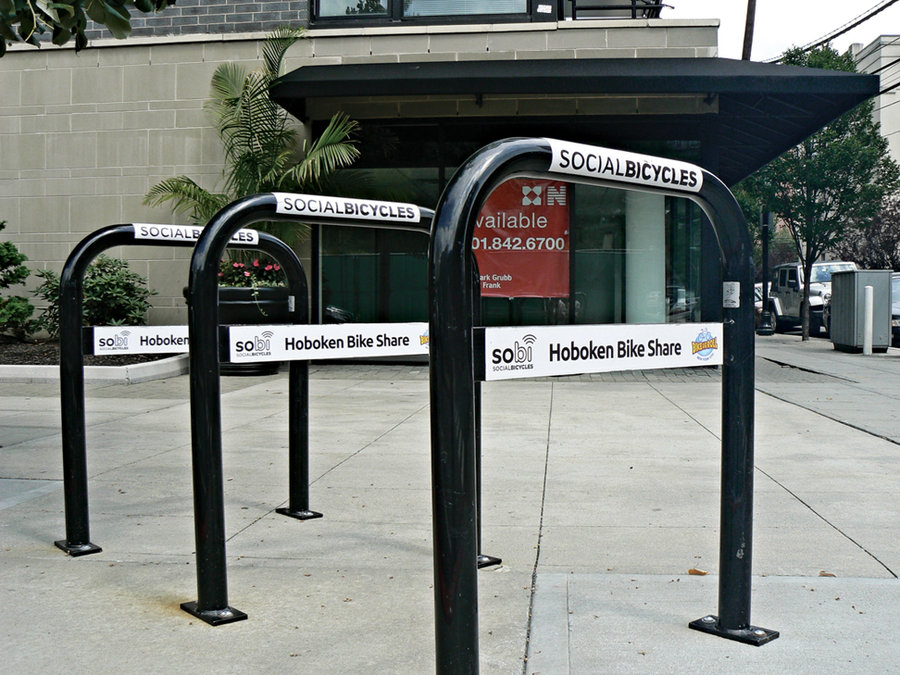Almost half a year after Hoboken, Jersey City, and Weehawken announced plans to launch a regional bike share program, the cities still have not received enough funding to launch the project.
Originally slated to begin this summer, the program now looks unlikely to arrive before spring 2015. At a time when bike shares in New York are struggling to stay in the black, the largest investors appear loath to subsidize a new bike share program in Hudson County.
According to a February press release, the three-city bike share is slated to become the largest next-generation bike share system in North America. Officials in the cities, including Hoboken Mayor Dawn Zimmer, remain committed to seeing the project through to fruition.
Still waiting for initial capital
According to a recent story in the Wall Street Journal, the cities need an estimated $2.5 million to buy full-service kiosks, bike stations, and 800 Cruiser Comfort bicycles from NextBike, a German bike share provider. Once the program is underway, it will be jointly funded by sponsorships, advertising, and user fees.
“There is strong interest in the program, but 100 percent of the financing has not yet been secured,” wrote Zimmer spokesman Juan Melli in an email this week. The mayor’s office could not provide the specific sponsors and exact percentage of funding currently secured.
“There is strong interest in the program, but 100 percent of the financing has not yet been secured.” – Juan Melli
____________
The North Jersey program will be operated by Bike and Roll, which currently offers bike rentals in five U.S. cities. The company referred all questions about the upcoming program to Mayor Zimmer’s office.
In June, Zimmer told the Wall Street Journal that despite the delay, she was still committed to seeing a bike share system in Hoboken. “One way or another, we’ll eventually get it done,” she said.
The program’s private funding scheme was intentionally designed to pass no costs on to the taxpayer. Melli reiterated that direct funding from municipalities is not being considered at this time.
In fact, if and when the program begins, Hoboken, Jersey City, and Weehawken will receive a percentage of profits after capital expenditures have been recouped, creating the possibility that they could actually make money from the bike shares in the future.
However, the cities must first get their program funded and underway. Reports have indicated that financial troubles in bike shares nationwide, and particularly in the Citi Bike system across the river in New York City, may have scared away potential investors for the Hudson County program.
“When Citi Bike had their issues, now all of a sudden sponsors are much more cautious and that’s had a significant impact, unfortunately,” Jersey City Mayor Steven Fulop told the Wall Street Journal.
Funding woes mirror NYC program
Like the forthcoming program in Hoboken, Citi Bike was pitched as incurring no cost on taxpayers, but it has been difficult to keep it fully funded. Banking giant Citigroup gave the program an initial seed fund of $41 million in exchange for 6,000 rolling blue advertisements and a wave of good press.
Just a year later, though, Citi Bike needs tens of millions more in sponsorships to cover operating costs and expansion into Brooklyn, Queens and upper Manhattan. Alta Bicycle Share, which operates the Citi Bike system, says that it has too many yearly members and not enough tourists and infrequent riders, who pay more per ride, to support the program solely through ridership fees.
This past Wednesday, the Wall Street Journal reported that New York City was close to a deal with REQX Ventures, an affiliate of real estate firm Related Companies, to cover the Citi Bike funding gap in exchange for a controlling stake in Alta. Yearly memberships are expected to increase from $95 to $140 or more.
But Citi Bike’s financial problems run deeper than just membership receipts. In January 2014, Bixi, the Montreal-based company that provides the technology for Citi Bike, Capital Bikeshare in Washington D.C., and Divvy in Chicago, filed for bankruptcy. The private enterprise was created by the city of Montreal in 2007 as a way to pay for Montreal’s own system by selling the technology it had developed internationally.
Bixi’s financial issues had been festering for years. It needed a $100 million bailout from Montreal in 2011, according to Bloomberg, and after Bixi software began malfunctioning in 2012, Citi Bike and Divvy withheld payments of over $5 million. By the beginning of this year, Bixi was nearly $46 million in debt.
Unlike Bixi bikes, which must be taken from and returned to specially designed “smart dock” stations, the vehicles in Hoboken’s bike share will use “smart lock” technology that allows them to be locked to normal bike racks.
Not Hoboken’s first ride
Mayor Zimmer hopes the joint bike share can build on a pilot program that took place in Hoboken from June to November of last year. The system used “smart lock” bikes made by Social Bicycles and was run by Bike and Roll.
The pilot program gave mixed indications about the demand for a bike share in Hudson County. Some 472 people signed up for the pilot, despite it being limited to only Hoboken residents who took a 15-minute orientation. Memberships cost $15 per month or $75 for the full period.
However, according to a report produced after the pilot was completed, the program averaged 21 rides per day. By comparison, Citi Bike had an average of 22,388 rides per day in April 2014.
The Social Bicycle-branded bike racks built for the pilot remain in place around town, some now unused while others have been adopted for use by personal bikes.
Carlo Davis may be reached at cdavis@hudsonreporter.com.
